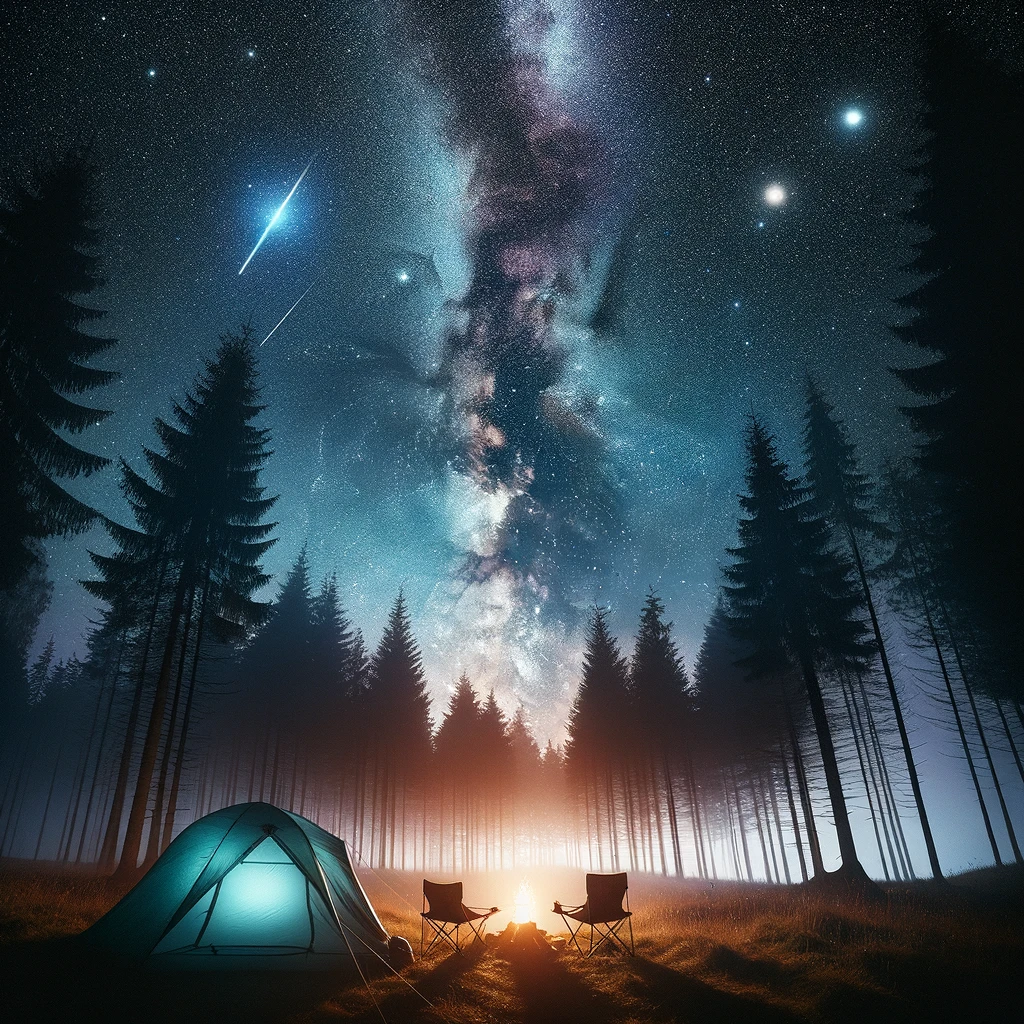There’s something magical about looking up at a star-filled sky while surrounded by nature. For tent campers, the opportunity to stargaze away from city lights is one of the most rewarding aspects of the outdoor experience. This guide will help you make the most of your nighttime observations, whether you’re a complete beginner or looking to enhance your stargazing skills.
Introduction
Stargazing while camping offers a unique opportunity to connect with the universe in a way impossible in urban environments. The lack of light pollution in remote camping areas reveals a sky teeming with stars, planets, and celestial wonders. Beyond the sheer beauty, observing the night sky can have profound psychological benefits, fostering a sense of peace and perspective that’s hard to find elsewhere.
Essential Equipment for Tent Camping Astronomers
You don’t need expensive equipment to start your stargazing journey. A good pair of binoculars can be more useful for beginners than a telescope. They’re portable, easy to use, and provide a wide field of view. If you decide to bring a telescope, consider a small, portable model that’s easy to set up and transport.
Navigation aids are crucial for identifying what you’re seeing. A simple star chart or planisphere can be invaluable, while smartphone apps like Stellarium or Sky Map offer interactive guides to the night sky. Bring a red light flashlight to preserve your night vision and a comfortable chair or reclining pad for extended viewing sessions.
Selecting the Perfect Campsite for Stargazing
Choosing the right campsite is crucial for optimal stargazing. Look for areas away from artificial light sources and with clear views of the horizon. Dark sky maps can help you find locations with minimal light pollution. Remember to consider the phase of the moon as well – a new moon will provide the darkest skies for observing faint objects.
Understanding the Night Sky
Learning to navigate the night sky is like learning a new language. Start by familiarizing yourself with the concept of celestial coordinates – right ascension and declination – which are used to locate objects in the sky. Identifying major constellations and asterisms (recognizable patterns of stars) will serve as signposts to help you find your way around the celestial sphere.
Observing Techniques for Campers
Allow your eyes at least 20-30 minutes to adapt to the darkness fully. Use averted vision – looking slightly to the side of faint objects – to detect dim stars and nebulae. Consider keeping a log or sketching what you observe to track your progress and enhance your memory of each stargazing session.
Seasonal Stargazing Highlights
Each season offers unique celestial sights. Summer is perfect for viewing the Milky Way and the Summer Triangle. Fall brings the Andromeda galaxy into prime viewing position. Winter showcases Orion and the bright stars of Canis Major and Gemini. Spring is ideal for observing galaxies in the Virgo Cluster.
Astrophotography Basics for Campers
Even with just a smartphone, you can capture beautiful images of the night sky. Use a tripod or stable surface for basic star field photos and experiment with long exposure settings. More advanced techniques like star trail photography can produce stunning results with minimal equipment.
Weather Considerations for Tent Astronomers
Clear skies are essential for stargazing, so check detailed weather forecasts before your trip. Be prepared to deal with dew on your equipment by bringing a small fan or dew heater.
Combining Astronomy with Other Camping Activities
Integrate stargazing into your camping routine with night hikes guided by the stars or storytelling sessions featuring constellation mythology. These activities can enrich your camping experience and create lasting memories.
Astronomy Etiquette in Campgrounds
Be mindful of other campers when stargazing. Use red lights to preserve everyone’s night vision and keep noise to a minimum during quiet hours. If you’re using a telescope, set it up in a location that won’t obstruct pathways or other campsites.
Enhancing the Experience: Group Stargazing
Stargazing can be a terrific social activity. Consider organizing a star party at your campsite, inviting fellow campers to join in and share equipment or knowledge. This can be a great way to meet like-minded enthusiasts and learn from each other.
Safety Considerations for Night Sky Observers
Always prioritize safety when stargazing. Familiarize yourself with your surroundings during daylight hours to avoid hazards in the dark. Be aware of local wildlife and take appropriate precautions, especially in areas with large predators.
Conclusion
Stargazing while camping opens up a world of wonder and discovery. With each trip, you’ll find yourself more attuned to the rhythms of the night sky and more adept at navigating its celestial landmarks. Astronomy is a journey, not a destination – there’s always something new to learn and observe.

Leave a Reply